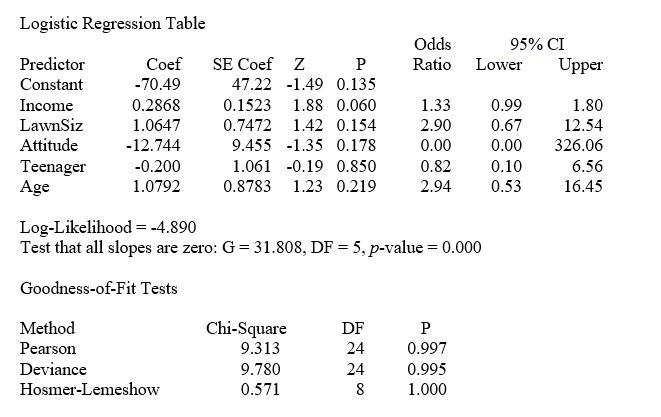TABLE 14-19
The marketing manager for a nationally franchised lawn service company would like to study the characteristics that differentiate home owners who do and do not have a lawn service. A random sample of 30 home owners located in a suburban area near a large city was selected; 15 did not have a lawn service (code 0) and 15 had a lawn service (code 1). Additional information available concerning these 30 home owners includes family income (Income, in thousands of dollars), lawn size (Lawn Size, in thousands of square feet), attitude toward outdoor recreational activities (Atitude 0 = unfavorable, 1 = favorable), number of teenagers in the household (Teenager), and age of the head of the household (Age).
The Minitab output is given below: 
-Referring to Table 14-19, there is not enough evidence to conclude that the model is not a good-fitting model at a 0.05 level of significance.
Definitions:
Stakeholder Laws
Regulations aimed at protecting the interests of all parties affected by a company's operations, not just its shareholders.
Staggered Terms
An arrangement where members of a governing body are elected at different times, so not all positions are up for election simultaneously.
Cumulative Voting
A voting system that allows shareholders to concentrate all their votes on a single candidate during a multiple-seat election, enhancing minority shareholders' representation.
Nonprofit Corporation
A legal entity organized for purposes other than making a profit, often focused on charitable, religious, educational, or public service objectives.
Q11: The owner of a local nightclub has
Q64: Referring to Table 15-4, which of the
Q75: The interpretation of the slope is different
Q78: Referring to Table 17-5, a p control
Q92: The smaller the capability index, the more
Q114: Referring to Table 16-13, what is your
Q129: Referring to Table 16-3, if a three-month
Q176: Referring to Table 13-13, the decision on
Q242: Referring to Table 14-10, the standard error
Q327: Referring to Table 14-12, what is the